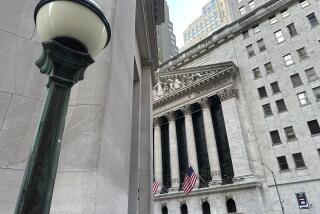Stocks Mixed in Thin Trading; Dow Loses 2.13
- Share via
Prices closed narrowly mixed on Wall Street Tuesday as rising oil prices triggered concerns about inflation and interest rates.
Stocks tracked the credit markets for much of the session, declining in early trading as Treasury prices slumped. Wall Street later shook off the drop in bonds and moved moderately higher, but in late afternoon the credit markets continued to fall in response to a surge in oil prices and stocks gave up their gains.
The Dow Jones index of 30 industrials closed 2.13 lower at 2,709.26 after rising as high as 2,728.88 earlier in the day.
Gainers were slightly ahead of losers in nationwide trading of New York Stock Exchange-listed issues, with 712 up, 664 down and 552 unchanged.
Big Board volume was a slim 77.61 million shares, down from 120.98 million in the previous session. Many traders were extending their Christmas holiday weekend.
Nationwide, consolidated volume in NYSE-listed issues, including trades in those stocks on regional exchanges and in the over-the-counter market, totaled 99.09 million shares.
Treasury prices skidded first because of an increase in Japan’s discount rate, which raised the specter of interest rates rising in the United States to keep up with Japanese yields.
Bonds continued to drop in later trading because of a surge in oil prices after several oil companies reported refinery shutdowns.
Rising energy prices are considered a harbinger of higher inflation and, in turn, higher interest rates. The Federal Reserve is less likely to relax credit and allow interest rates to drop when inflation is accelerating.
“The bond market finally put the chill into traders,” said Michael Metz, a stock market analyst with Oppenheimer & Co.
Stock prices had risen as bargain hunters entered the market but by late afternoon “the bargains were resistable and they walked away,” Metz said.
The most active issue on the NYSE was Bank of New England, which fell 1/8 to 7 3/8.
Exxon, forced to shut down a major Texas refinery after a weekend fire, was off 1/2 at 50 1/8.
Bank of Boston picked up 1 3/8 to 18 1/8 after it was disclosed that a group led by CBS Chief Executive Laurence A. Tisch held a 6.6% stake in the company.
UAL surged 7 1/4 to 170 1/4 amid continued speculation that the parent of United Airlines might go private in an employee-led buyout.
Among other big-name stocks, IBM was down 7/8 to 94 1/2, AT&T; was unchanged at 44 3/4 and Philip Morris fell 1/4 to 40.
The key index on the Tokyo Stock Exchange closed at yet another record high Tuesday. The 225-issue Nikkei average gained 257.69 points, or 0.67%, ending at 38,681.31.
The London Stock Exchange as well as most European markets were closed Tuesday for Boxing Day.
CREDIT Bonds Fall on Hikes in Rates, Oil Prices U.S. Treasury bond prices plummeted Tuesday, hurt by an increase in Japan’s discount rate and a huge rise in heating oil prices, which fanned inflationary concerns.
Selling initially began in shorter-term securities, but quickly engulfed the entire market.
The benchmark 30-year bond closed down about 1 1/4 point, pushing the yield up to 7.99% from 7.88% Friday.
The plunge in bond prices Tuesday was compounded by the low trading volume and the fact that many trading houses were running with few staff members. “This is traditionally the slowest week of the year,” said one dealer.
Thus, dealers were selling into a market that was too thin to offer substantial bids. “There is not a lot of liquidity out there, so even a normally small trade could appear to have a bigger impact,” a dealer said.
“The glaring problem today was that houses had their B teams in. Most firms were less than half staffed, and once prices started falling, they just kept going,” another dealer said.
Part of the downturn in bond prices was because of the rise in oil prices and Japanese interest rates, which squelched hopes of another round of credit easing by the Federal Reserve Board, which lowered its target rate for federal funds last week to 8.25% from 8.5%.
The federal funds rate is the interest rate that banks charge each other for overnight loans; the rate is often used to gauge the central bank’s monetary policy. Lower interest rates, which fuel economic growth, tend to boost bond and stock prices.
The funds were quoted Tuesday at 8.5% after averaging 8.19% Friday.
CURRENCY Dollar Declines; Gold Falls in N.Y. The dollar declined Tuesday against most key foreign currencies in extremely thin post-holiday trading.
Gold prices fell in New York after rising in Asia.
Traders said the market had little reaction to the Bank of Japan’s decision Monday to raise its discount rate--the interest charged for loans to commercial banks--to 4.25% from 3.75%. The move, which should boost the value of the yen against the dollar, had been widely anticipated by the market, they said.
Nonetheless, the overall sentiment toward the dollar remains bearish as prospects for lower U.S. interest rates rise with more evidence of economic weakness, said Earl I. Johnson, a trader with Harris Trust & Co. in Chicago.
In Tokyo, the dollar closed at 142.37 yen, down 0.35 yen from Monday. In New York, the dollar traded at 141.845 yen, lower than 142.35 yen Friday.
The dollar lost value against the British pound, with sterling costing $1.6265, higher than $1.62425 Friday.
Other late dollar rates in New York, compared with late quotes Friday, included: 1.6987 West German marks, down from 1.7070; 1.54825 Swiss francs, down from 1.5490; 1.16005 Canadian dollars, up from 1.15925; 5.8020 French francs, down from 5.8345, and 1,272.75 Italian lire, down from 1,277.75.
More to Read
Inside the business of entertainment
The Wide Shot brings you news, analysis and insights on everything from streaming wars to production — and what it all means for the future.
You may occasionally receive promotional content from the Los Angeles Times.










